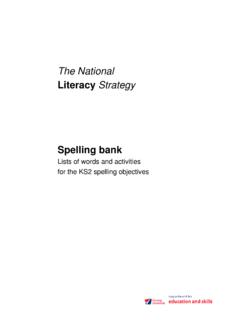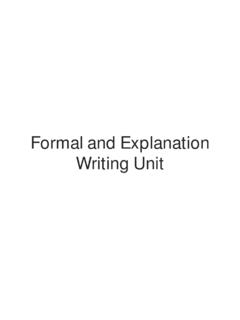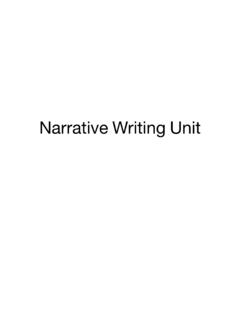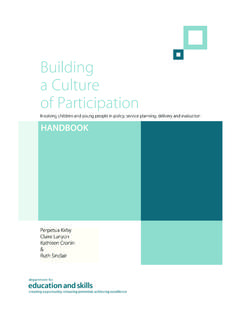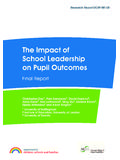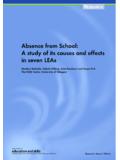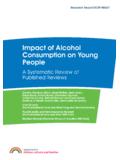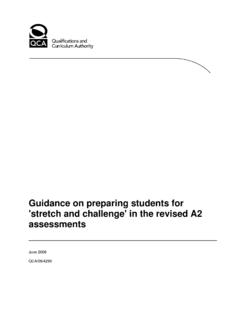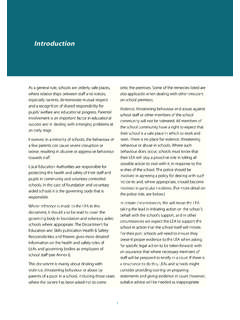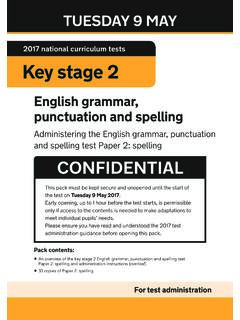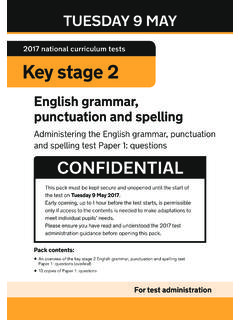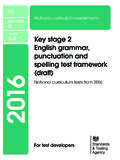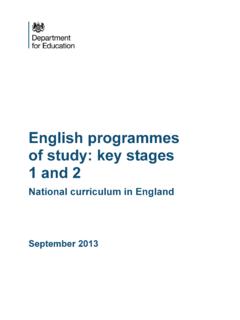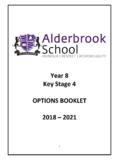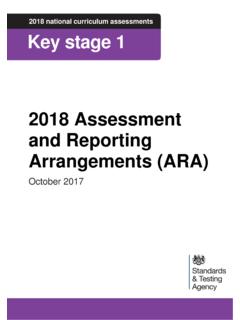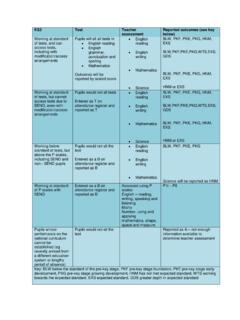Transcription of National Curriculum for English Key Stages 1 and 2 …
1 National Curriculum for English Key Stages 1 and 2 Draft National Curriculum review Contents Key Stage 1 Programme of Study Year 1 .. 5. Year 2 .. 10. Lower Key Stage 2 Programme of Study Years 3 4 .. 15. Upper Key Stage 2 Programme of Study Years 5 6 .. 20. Appendices and Glossary Appendix 1: spelling .. i Appendix 2: grammar and punctuation .. xv Glossary .. xviii Purpose of Study English has a pre-eminent place in education and in society. It is a subject in its own right and the medium for teaching; for pupils, understanding language provides access to the whole Curriculum .
2 Through being taught to write and speak fluently, pupils learn to communicate their ideas and emotions to others; through their reading and listening, others can communicate with them. Through reading in particular, pupils have a chance to develop culturally, emotionally, spiritually and socially. Literature, especially, plays a key role in such development. All the skills of language are essential to participating fully as a member of society; pupils, therefore, who do not learn to read and write fluently and confidently are, in every sense, disenfranchised.
3 Aims The overarching aim for English in the National Curriculum is to promote high standards of literacy by equipping pupils with a strong command of the written and spoken word, and develop a love of literature through widespread reading for enjoyment. The National Curriculum for English aims to ensure all pupils: read easily, fluently and with good understanding develop the habit of reading widely and often for both pleasure and information acquire a wide vocabulary, an understanding of grammar and knowledge of linguistic conventions for reading, writing and spoken language appreciate our rich and varied literary heritage write clearly, accurately and coherently, adapting their language and style in and for a range of contexts, purposes and audiences use discussion in order to learn.
4 They should be able to elaborate and explain clearly their understanding and ideas are competent in the arts of speaking and listening, making formal presentations, demonstrating to others and participating in debate. Draft 1 of 24. Reading The Programmes of Study for reading consist of two dimensions: Word reading Comprehension (both listening and reading). It is essential that teaching focuses on developing pupils' competence in both dimensions; different kinds of teaching are needed for each. Skilled word reading involves both the speedy working out of the pronunciation of unfamiliar printed words (decoding) and the speedy recognition of familiar printed words.
5 Underpinning both is the understanding that the letters on the page represent the sounds in spoken words. This is why phonics should be emphasised in the early teaching of reading to beginners ( unskilled readers) when they start school. Good comprehension draws from linguistic knowledge (in particular of vocabulary and grammar ) and on knowledge of the world. Comprehension skills develop through pupils' experience of high-quality conversation with the teacher, as well as from reading and discussing a range of stories, poems and non-fiction.
6 All pupils must be encouraged to read widely across both fiction and non- fiction to develop their knowledge of themselves and the world in which they live, and to establish an appreciation and love of reading. Reading widely and often increases pupils' understanding and vocabulary because they encounter words they would rarely hear or use in everyday speech. It also opens up a treasure-house of wonder and joy for curious young minds. It is essential that, by the end of their primary education, all pupils are able to read fluently, and with confidence, in any subject in their forthcoming secondary education.
7 Draft 2 of 24. Writing The Programmes of Study for writing are constructed similarly to that for reading: Transcription ( spelling and handwriting). Composition (articulating ideas and structuring them in speech and writing). It is essential that teaching develops pupils' competence in these dimensions, that is, transcription and composition. In addition, pupils should be taught how to plan, revise and evaluate their writing knowledge that is not required for reading. These aspects of writing have been incorporated into the Programmes of Study for composition.
8 Writing down ideas fluently depends on effective transcription, that is, on spelling quickly and accurately through knowing the relationship between sounds and letters (phonics) and understanding the morphological (word structure) and orthographic ( spelling structure) patterns of words. Writing also depends on fluent, legible and, eventually, speedy handwriting. Effective composition involves articulating and communicating ideas, and then organising them coherently for a reader. This requires clarity, awareness of the audience, purpose and context, and an increasingly wide knowledge of vocabulary and grammar .
9 Spoken language The National Curriculum for English reflects the importance of spoken language in pupils' development linguistic, cognitive and social across the whole Curriculum . Teachers should ensure the continual development of pupils' confidence and competence in spoken language. The quality and variety of language that pupils hear and speak are key factors in developing their vocabulary, grammar and understanding for reading and writing. Pupils should develop a capacity to explain their understanding of books and poems, and to prepare their ideas prior to writing.
10 They must be assisted in making their thinking clear to themselves as well as to others and teachers should ensure pupils build secure foundations by using discussion to probe and remedy their misconceptions. Pupils should also be taught to understand and use the conventions for discussion and debate. Draft 3 of 24. spelling , grammar and glossary The two appendices on spelling and on grammar and punctuation give an overview of the specific features that should be included in teaching the Programmes of Study.
